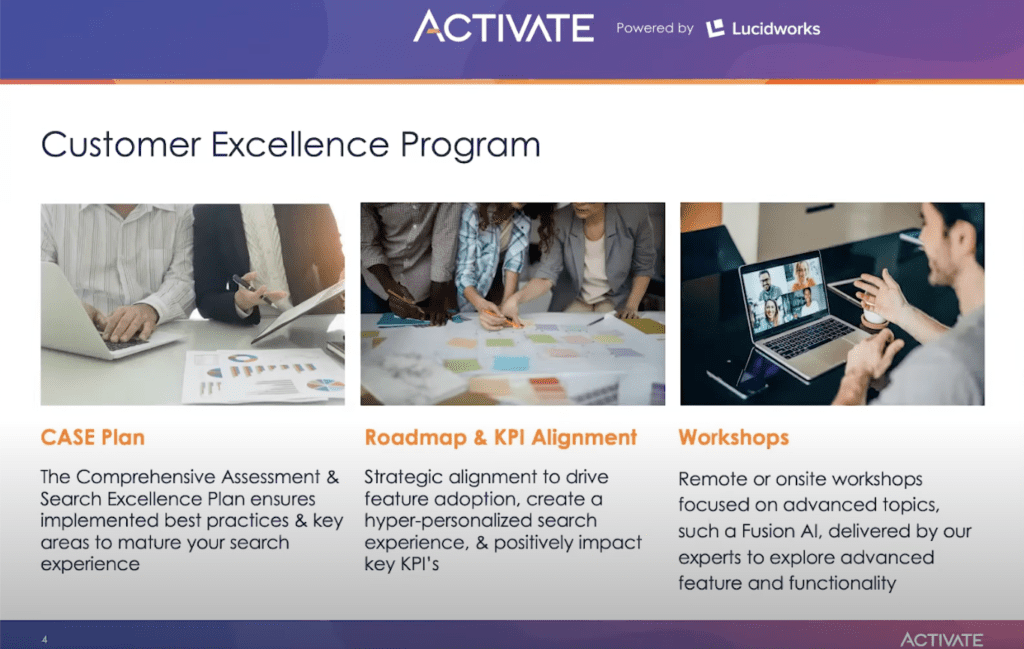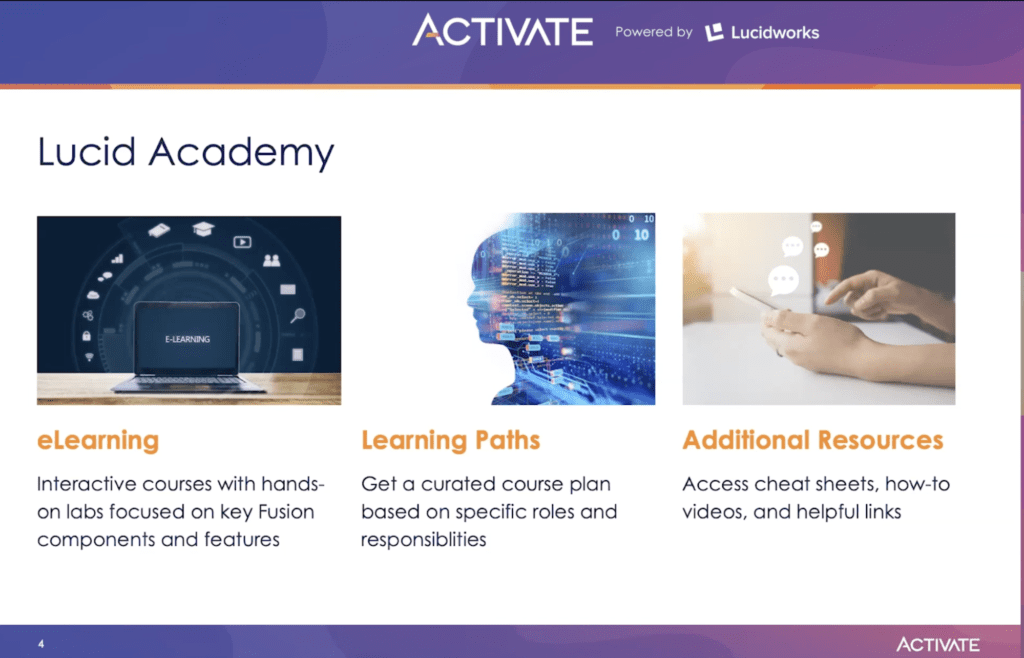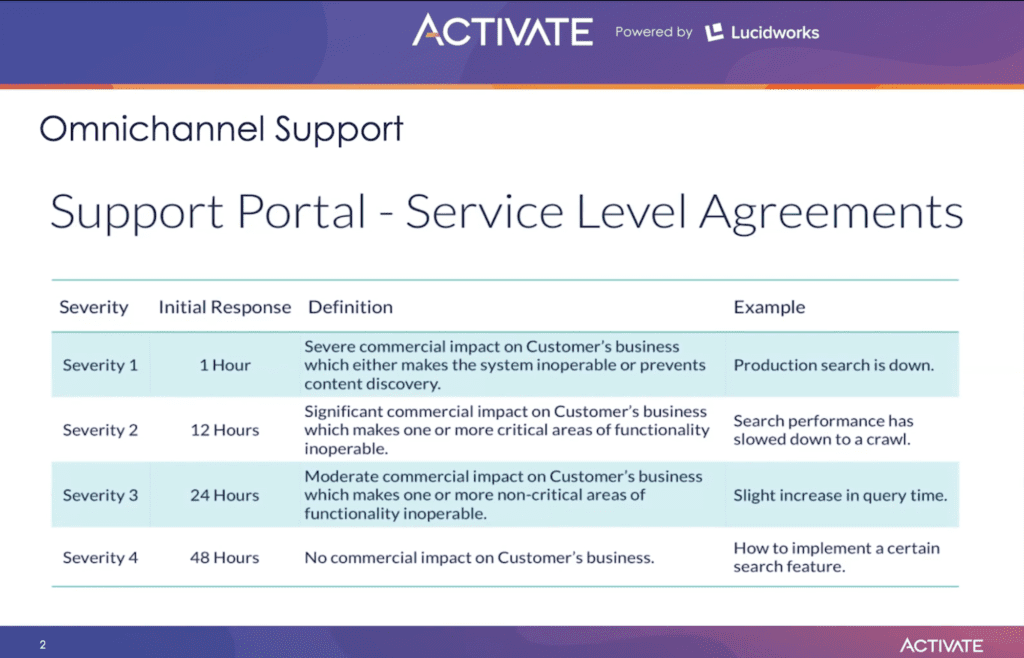Tips from Customer Success, Training, and Support
One of the most informative sessions for Lucidworks customers at virtual Activate this year was delivered by the Lucidworks customer excellence, training, and support teams.

The sessions provided Lucidworks customers with tips to maximize their engagement with Lucidworks so Fusion can be utilized to its full potential.
Customer Success
From the customer success team, Senior Director Lana Klestoff and Director Johanna Parker described how their team aligns with customers to help reach business goals and improve customers’ KPIs. Each customer is paired with a dedicated CS team member based on industry expertise to provide strategic value and insight into what others tackling similar business problems have used to surmount obstacles.
If a complex problem requires support from Fusion or Solr experts, the CS representative can tap those internal resources for collaboration. Customer feedback is also passed to the Lucidworks product team from customer success reps to help define the Fusion roadmap. Some of Fusion’s most innovative new features began as customer requests.
The three strategic initiatives provided to customers are:
- CASE Plans
- Roadmap and KPI Alignment
- Workshops

The CASE Plan is a comprehensive assessment of a customer’s deployment and engagement with Fusion. After reviewing business objectives, Lucidworks provides recommendations for optimizing a customer’s product implementation and advancing the theirn progress on the search maturity model.
With this assessment completed and top KPIs identified, a customer and his dedicated CS resource are firmly aligned on the customer’s roadmap for Fusion, search, and related business objectives. This allows the CS team member to take a proactive approach in furthering customer initiatives and reaching goals.
The final asset highlighted by the customer success team was the skill-enhancing workshops available through Lucidworks, which was expanded upon by Training Manager Nikki Batchellor.
Training
Lucidworks offers training via multiple channels:
- instructor-led live trainings with hands-on labs in a Fusion environment
- eLearning courses
- cheat sheets, handouts, and how-to videos
The best place to discover what’s available is LucidAcademy, a virtual one-stop shop for all Fusion training. At LucidAcademy, interactive elearning courses (like this primer on Predictive Merchandiser) and hands-on Fusion feature and component exercises can be tailored to specific job functions for maximum effect with minimal effort. Downloadable cheat sheets, how-to videos, and helpful links are offered to enhance Fusion knowledge and skills.

Instructor-led live courses include: Fusion Foundations, Advanced Fusion, Fusion AI, and App Studio. Customers can either reserve a seat at a scheduled session or schedule a private training for their company, choosing dates and times that fit their schedule with a curriculum designed to fit their specific needs.
Technical Support
At Lucidworks, technical support is considered part of the overall experience and so part of the product. “We have been building support just like a product: resilient, simple, and complete,” shared VP of Technical Support Ram Ramadas.
To support this model, a few key values are kept top-of-mind:
- Drive customer success by solving issues before they start impacting business.
- Empower customers with information to self-solve for quick resolution of their issues.
- Deliver effective and efficient support through investment in people, processes, and infrastructure.
- Build customer loyalty, measured by NPS and CSAT.
- Observe a customer-first ethos.
The global support team observes a follow-the-sun model to provide support across geographically distributed teams 24/7/365. Telephone, email, and web-based support is available. Best-in-class holiday coverage means Lucidworks technical support is there to lean on when most commerce retailers are experiencing the largest commercial event and highest demand on their systems of the year.
Embracing a “know your customer” ethos by working closely with a few customers forms important relationships and reduces customer frustration. No need to describe your dilemma again to a third person, your dedicated representative knows the history of what you’re hoping to accomplish. Similar to the relationship with customer success, insights from customers gathered by technical support are shared with engineering and product management to improve Fusion, processes, tools, and ultimately the overall customer experience.
“Best practices that we’ve learned and adopted are working in a partnership with our clients to resolve their issues, generating quality discussions with them as well as aiding them to a quicker resolution that suits their needs,” said Technical Support Manager Cassandra Garris.
While the team aims for a proactive approach, it’s understood that reactive issues can occur so a dedicated team of support engineers are available to provide service when necessary. When issues arise, the severity level of the problem determines the response time, as detailed in the chart below.

When it is necessary to open a support ticket, making sure that a few key fields are completed will assist in a quicker resolution. The severity level (per the chart above), product line (Fusion or Solr), the environment (development, staging, or production), a description of the issue, and the subject provide a clear description of what’s happening to eliminate some of the back and forth and help progress move along appropriately. Attaching relevant logs or screenshots is also beneficial.
If a support case needs to be escalated (usually production failures or outages, recurrent issues happening in production, hard deadlines for a fix or peak season), there are three avenues to get this done: via the ticket in Zendesk, your CS representative, or Support Management. No matter what route the escalation takes, a ticket will be created in the support portal with a severity level S1. This alerts the primary technical support engineer on call by text, by email, and by the portal itself. The team turns prompt attention to the ticket so work can begin as quickly as possible.
What’s up next in technical support? Self-service offerings will be enhanced by publishing content with a Knowledge Centered Service methodology. Business automation will be implemented within the support systems to provide optimized workflows catering to each customer’s specific needs and route their case to the right Support Engineer the first time. Building a Lucidworks community where customers can find useful content, collaborate and exchange ideas with other customers, partners, and Lucidworks employees is also in the works. For more tips check out the presentation from Activate here.